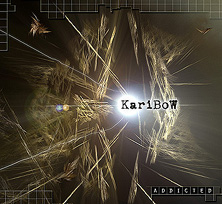 The
band known as KariBow is making waves with their 2015 CD entitled
Addicted. Featuring the songs, vocals and guitars
of Oliver Rüsing, the 16 track, 79 minute Addicted
CD is filled with all sorts of progressive rock signposts, most
notably 1980's YES and late 1990s YES, the latter (Ladder?) period
sometimes referred to as the Billy Sherwood era. Even vocally, Rüsing
sounds influenced by both Billy Sherwood and Chris Squire and Oliver's
guitar work also gets good exposure on the CD. Although Rüsing
performs the bulk of the Addicted album in the studio by himself,
in a live setting he gets solid backup from his band mates. Speaking
about the difference between recording the CD and the live Karibow
band in the following interview, Oliver tells mwe3.com, "Karibow
is a five piece band and it consists of Markus Bergen (keys),
Gerald Nahrgang (drums), Chris Thomas (guitars),
Thomas Wischt (bass) and myself (vocals, guitars). These guys
are skilled and ambitious musicians, and they are good friends at
the same time. You're right about my key role in writing and producing,
but the band does also have an impact on what Karibow sounds like
on stage because everyone of us feels responsible for the live arrangements."
Regarding the title of the CD, Oliver adds, "The
album title originates from a song named “Addicted”. It
was supposed to be the title track and it's funny that the song itself
didn't make it onto the album. There's a line in it that goes “The
shape of the wind and the moving water, I'm addicted to it all.”
It's that kind of addiction. It's the addiction to life and to the
beauty of it."
Another
fact worth mentioning to music fans is the superb layout and artwork
/ concept of the Addicted CD packaging. A good choice for progressive
rock fans, KariBow combines plenty of dynamic rock elements on their
critically acclaimed Addicted CD. www.karibow.com
The
band known as KariBow is making waves with their 2015 CD entitled
Addicted. Featuring the songs, vocals and guitars
of Oliver Rüsing, the 16 track, 79 minute Addicted
CD is filled with all sorts of progressive rock signposts, most
notably 1980's YES and late 1990s YES, the latter (Ladder?) period
sometimes referred to as the Billy Sherwood era. Even vocally, Rüsing
sounds influenced by both Billy Sherwood and Chris Squire and Oliver's
guitar work also gets good exposure on the CD. Although Rüsing
performs the bulk of the Addicted album in the studio by himself,
in a live setting he gets solid backup from his band mates. Speaking
about the difference between recording the CD and the live Karibow
band in the following interview, Oliver tells mwe3.com, "Karibow
is a five piece band and it consists of Markus Bergen (keys),
Gerald Nahrgang (drums), Chris Thomas (guitars),
Thomas Wischt (bass) and myself (vocals, guitars). These guys
are skilled and ambitious musicians, and they are good friends at
the same time. You're right about my key role in writing and producing,
but the band does also have an impact on what Karibow sounds like
on stage because everyone of us feels responsible for the live arrangements."
Regarding the title of the CD, Oliver adds, "The
album title originates from a song named “Addicted”. It
was supposed to be the title track and it's funny that the song itself
didn't make it onto the album. There's a line in it that goes “The
shape of the wind and the moving water, I'm addicted to it all.”
It's that kind of addiction. It's the addiction to life and to the
beauty of it."
Another
fact worth mentioning to music fans is the superb layout and artwork
/ concept of the Addicted CD packaging. A good choice for progressive
rock fans, KariBow combines plenty of dynamic rock elements on their
critically acclaimed Addicted CD. www.karibow.com
mwe3.com presents
an interview with
Oliver Rüsing
of KARIBOW
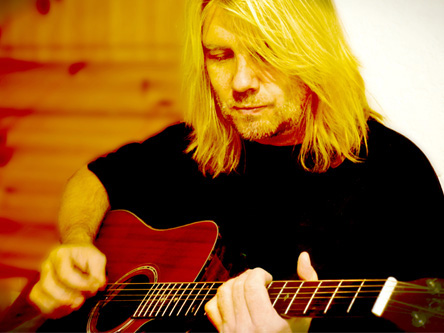 mwe3:
When did you start performing and writing music and when did you start
your recording career?
mwe3:
When did you start performing and writing music and when did you start
your recording career?
Oliver Rüsing: I started playing guitar when I
was 10. One year later, I borrowed my first drum kit from my school’s
music inventory to join the school band as a drummer. That was the
time when we wrote our first songs - Motörhead style!. For whatever
reason, I had always been responsible for writing lyrics as well.
The first album I produced completely on my own was called Waterfront.
All recordings were done using a simple four-track machine and some
weird overdubbing techniques. That's how I started back in 1989, and
I remember it was really fun.
mwe3: I know you play most of the Addicted album yourself
but tell us about the KariBow Live Project. Who are the key members
of KariBow and who else do you credit for helping you get such a good
sound on the CD?
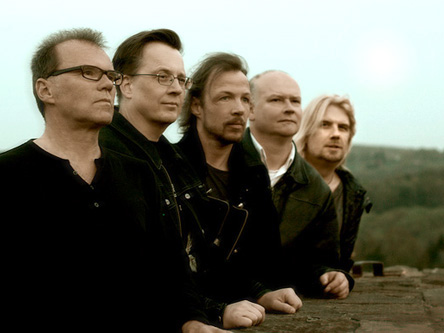 Oliver
Rüsing: Karibow is a five piece band and it consists of Markus
Bergen (keys), Gerald Nahrgang (drums), Chris Thomas (guitars), Thomas
Wischt (bass) and myself (vocals, guitars). These guys are skilled
and ambitious musicians, and they are good friends at the same time.
You're right about my key role in writing and producing, but the band
does also have an impact on what Karibow sounds like on stage because
everyone of us feels responsible for the live arrangements.
Oliver
Rüsing: Karibow is a five piece band and it consists of Markus
Bergen (keys), Gerald Nahrgang (drums), Chris Thomas (guitars), Thomas
Wischt (bass) and myself (vocals, guitars). These guys are skilled
and ambitious musicians, and they are good friends at the same time.
You're right about my key role in writing and producing, but the band
does also have an impact on what Karibow sounds like on stage because
everyone of us feels responsible for the live arrangements.
Talking about the overall sound of the CD, the positive feedback has
indeed been overwhelming. Last Sunday for example I met Michael Sadler
and we talked about the album. He thinks it sounds excellent and hearing
him saying that made me feel deeply honored.
I am a person who likes to get very much into details with almost
everything, and that may be noticeable in the mixes as well, especially
when it comes to separating frequencies and arranging instruments
within the stereo spectrum. But it’s boon and bane, and you have
to learn where to stop and finish your work.
The mastering job was done in cooperation with Eroc, who was a member
of the band Grobschnitt in the 1970s. Today, he’s pretty famous
for his mastering skills. Nevertheless, Addicted was a real
challenge because of its complex arrangements. Eroc called it a “Diva”
because it took us about a month to manage it. He appreciated my “elegant
mixes” (in his words), but I think he was the one who gave the
album the right “punch”.
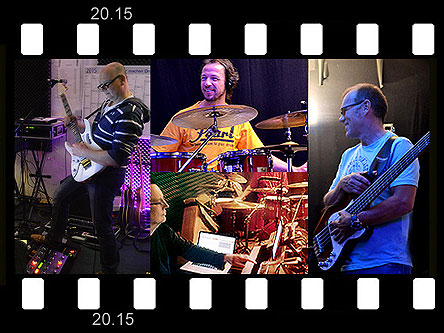 mwe3:
How did you come up with the name KariBow and why do you call the
CD Addicted? Is that the right way to spell it with a capital
K and capital B?
mwe3:
How did you come up with the name KariBow and why do you call the
CD Addicted? Is that the right way to spell it with a capital
K and capital B?
Oliver Rüsing: In 1995, I was trying to find a unique
name for the new project I was making plans for. A friend of mine
had just spent his holidays in Tanzania and he came back telling me
that the people over there would use the word “karibu” synonymously
with “hello”. I liked the sound of it, but since I did not
want to be mistaken for a moose-like animal, I had to slightly modify
it. At that time I was also pretty much into role playing games, almost
always exploring virtual worlds as a “ranger”, carrying
a bow. So I made up a new word that included both “carry a bow”
as well as “Karibu”. That's the whole story behind “Karibow”.
The album title originates from a song named “Addicted”.
It was supposed to be the title track and it's funny that the song
itself didn't make it onto the album. There's a line in it that goes
“The shape of the wind and the moving water, I'm addicted
to it all.” It's that kind of addiction. It's the addiction
to life and to the beauty of it.
Well, the capital B… I am not quite sure about it yet, but it
actually underlines the story behind the name. Some reviewers adapted
the capital letter from the album cover but, to be honest, I never
intended it could become a logo because the design of the band name
had changed several times over the years. Briefly, I am not sure if
we will keep the capital B, but to everybody who wants to use it:
Feel free and we'll make it a democratic choice!
 mwe3:
“Change” is a great way to start off the Addicted CD.
Kind of reminds me of 1980s YES. It’s a good introduction to
the power of your music. Is that one of the most powerful songs you
do live?
mwe3:
“Change” is a great way to start off the Addicted CD.
Kind of reminds me of 1980s YES. It’s a good introduction to
the power of your music. Is that one of the most powerful songs you
do live?
Oliver Rüsing: Well, 90125 (1983) and Big Generator
(1987) were indeed my first YES albums and I am sure they strongly
influenced my understanding of music. “Change” is our favorite
opener for live gigs because of its combination of power and catchy
melodies. It easily breaks the ice.
mwe3: Is track 2, “Primeval” a plea for the future?
Just the word “Primeval” sounds a bit scary. Do you mean
we’re destined for a different future? “Prepare for a stormy
ride”...
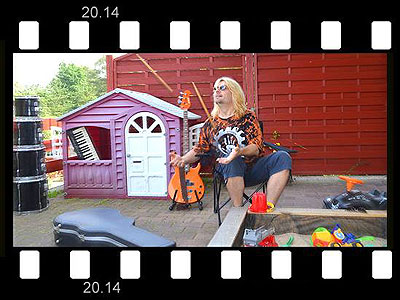 Oliver
Rüsing: “Primeval” is an impassioned plea to our
understanding of what it means to be human. For me personally, being
human means feeling responsible because responsibility is the natural
counterpart of intelligence and the gift of mind. The word primeval
refers to the human conflict between development and regression. We
start as little babies and 80 years later many of us will end up old,
experienced and washed-out. Life’s very exciting but it’s
indeed a “stormy ride”. From my personal point of view,
the time that's left in between is very precious and we should use
it to make this world a better place than it was before we were born.
Oliver
Rüsing: “Primeval” is an impassioned plea to our
understanding of what it means to be human. For me personally, being
human means feeling responsible because responsibility is the natural
counterpart of intelligence and the gift of mind. The word primeval
refers to the human conflict between development and regression. We
start as little babies and 80 years later many of us will end up old,
experienced and washed-out. Life’s very exciting but it’s
indeed a “stormy ride”. From my personal point of view,
the time that's left in between is very precious and we should use
it to make this world a better place than it was before we were born.
mwe3: “On Liquid Terrain” is another driving rocker.
Your music is very futuristic. I like the line “A life on
a high wire”... the duality of mankind, ending up on liquid
terrain.
Oliver Rüsing: Well, life is not safe at all. Everyone
will die, no doubt about it. It's natural. But “On Liquid Terrain”
has a lot to do with the insecurity of relationships as well. Everything
in life is constantly changing and it's all about temporary states
of balance. Therefore, nothing in this world can last forever. If
you are aware of it, it feels like you're moving on liquid terrain.
I am thankful for every day that makes me keep the balance. Life is
a fragile beauty.
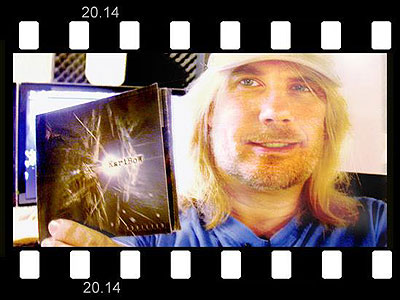 mwe3:
The fourth track on Addicted , “Believe” would make
a great single track. Seems like another duality song. It’s like
we just can’t win sometimes. It’s like mass consciousness
controls all.
mwe3:
The fourth track on Addicted , “Believe” would make
a great single track. Seems like another duality song. It’s like
we just can’t win sometimes. It’s like mass consciousness
controls all.
Oliver Rüsing: Exactly. But on the other hand, the magic
that surrounds us and the overwhelming beauty in every detail of our
world makes it hard to draw a clear distinction between what is “real”
and what is not. I think the idea of being “real” is only
a state of mind. On the other hand, it's that state of intoxication
that gives us a beautiful feeling of home, just like the magic of
a groovy song like “Believe”. So start dancing and believe
in the flow!
mwe3: Track 5 “Home Of Cain” sounds biblical.
Oliver Rüsing: Well, I used the image of Cain because
the story of Cain and Abel addresses the meaning of envy, jealousy
and greed. I think we are all living together in a home of Cain in
a certain way, even inside ourselves. I wish it was different and
I hope that some day it will be.
mwe3: Track six “Stella Nova” is about relationships?
“Heal and break and heal again...”
Oliver Rüsing: Yes, it's a song about being caught
in a golden cage. The wish for a new star in your life can be very
helpful sometimes, especially when your emotional condition is very
unstable.
mwe3: Track seven on Addicted “Shine On” is
a very upbeat. Must be a good number to play live.
 Oliver
Rüsing: “Shine on” is a song for the children in
general. If they don't shine, nothing ever will. What also makes it
a great live song is the fact that you can easily sing along with
the chorus, which is always good for interaction with the audience.
Oliver
Rüsing: “Shine on” is a song for the children in
general. If they don't shine, nothing ever will. What also makes it
a great live song is the fact that you can easily sing along with
the chorus, which is always good for interaction with the audience.
mwe3: Track 8, “Collaborator” is a near instrumental.
Is it a plea for unity in work? “One day we’ll know what
we have done.”
Oliver Rüsing: Symbolically, yes. You can also find this
unity in the arrangement which is bringing order to various musical
components. The backbone of the song is the bass line which is pretty
complicated but constant. “Collaborator” is intricate stuff
with several world instruments, layers and time changes. The line
you mentioned reminds us to be farseeing and sane.
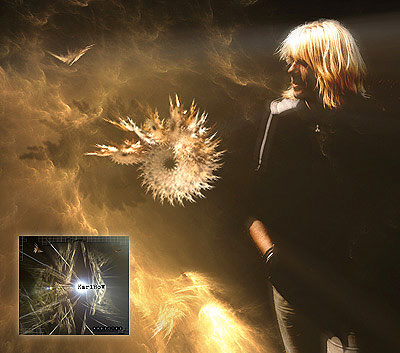 mwe3:
Track 9 “The Cry” is, in my opinion, the centerpiece of
the Addicted album. Is that the single radio edit version of
the track?
mwe3:
Track 9 “The Cry” is, in my opinion, the centerpiece of
the Addicted album. Is that the single radio edit version of
the track?
Oliver Rüsing: Yes, it is. I cut it down to 4:32 to make
it suitable for airplay with bigger mainstream radio stations. There
is a longer version of “The Cry” and it will be available
as a download from our web shop later this year.
mwe3: “F8 Al Ba6”, track ten, is instrumental jazz
fusion. Sounds like you enjoyed making that track. Is it challenging
to be a one man orchestra? Is there a specific sound you were going
for on that track and how did you come up with the track name?
Oliver Rüsing: The name of the track looks like a chemical
formula and it's pronounced “Fatal Basics”, which refers
to our basic conditions. To some people it may describe the condition
of their nerve ends when they listen to the song... yes, it's challenging
- and playing it with the band is even more challenging because you
have to deal with the slightly different individual micro-timings.
The whole “orchestra” thing is a lot easier when I do it
alone. Since I'm the person I'm spending most of my time with, I am
pretty much used to my own “feel”. And that's very helpful,
particularly with regard to complicated breaks and synchronicity.
Nevertheless, a track like “F8 Al Ba6” is always an opportunity
to push the envelope and the sound of it is simply the result of a
creative and experimental approach to all kinds of communication between
the instruments. You know, I want to be entertained by my music when
I'm writing, playing and listening... and to me, “F8 Al Ba6”
never gets boring.
mwe3: Track eleven “Spark” is a low key track. Is
that like an interlude track? Sort of like the spark of life. A song
of hope.
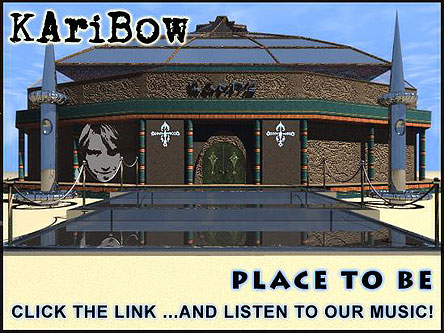 Oliver
Rüsing: "Spark" is about the process of coming
into this world. For me as a Buddhist, life or - to be exact - returning
to life starts with the lust for life which is a main form of greed.
It's this tiny but powerful spark that keeps the wheel turning.
Oliver
Rüsing: "Spark" is about the process of coming
into this world. For me as a Buddhist, life or - to be exact - returning
to life starts with the lust for life which is a main form of greed.
It's this tiny but powerful spark that keeps the wheel turning.
mwe3: Is track 12 , “Place To Be” a wake up call?
I was thinking it sounded like a later period BeeGees song.
Oliver Rüsing: Maybe it’s the high background vocals
that remind you of the Gibbs. For a passionate dreamer like me, it's
sometimes hard to wake up to the reality of society and still hold
on to my ideals. If you are not willing to give them up, not by any
means, it's almost inevitable that you're constantly trying to find
your “right place to be”. I have been a seeker all my life
and I am sure that won't ever change. By the way, we all love the
song for its strange time changes in the keyboard/guitar solo part.
mwe3: Track 13 “The Violent Plains” is a very interesting
track. Another duality kind of song. Where are the violent plains?
“For the sake of hell, don’t bite that hand no!”
Oliver Rüsing: It's a song about a lopsided relationship.
The “plains” are the old emotional battle grounds that become
most violent when you recall the things that happened during all those
fights. "TVP" is a song about scars and regrets, but there's
also a lot of hope in it. It's not easy to dance and fight at the
same time, so if you have a choice, you better dance!
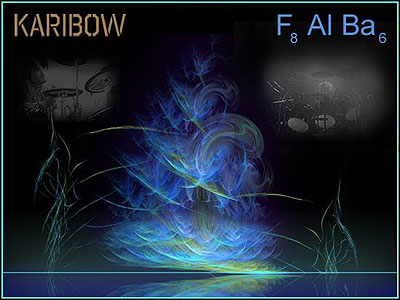 mwe3:
Track 14 “Always There” is a great ethereal rocker with
a definite pop edge. It kind of reminded me of The Zombies! Very sparse
but very effective. Is this track a kind of different direction for
you?
mwe3:
Track 14 “Always There” is a great ethereal rocker with
a definite pop edge. It kind of reminded me of The Zombies! Very sparse
but very effective. Is this track a kind of different direction for
you?
Oliver Rüsing: “Always There” was originally
written for an unplugged album. That's why the instrumentation is
different. It can be performed with only an acoustic guitar. A musical
piece full of trust.
mwe3: Is “Something” is another hopeful, kind of
reaching out type of song?
Oliver Rüsing: Even if you live your life thinking a lot
about the things you do and everything you're involved in, there are
certain situations when you need somebody else to convince you that
it's okay to be right here, right now. It's both a call and a plea
for friendship and hope. Very much reaching out and powerful. It
was one of the first songs I wrote for Addicted.
mwe3: “9/16” is another interesting title. A
very heavy metal type track with multiple time signatures. Is that
one of the most complicated KariBow tracks? How many different time
signatures are in that song? Anyway it’s a great album closer.
Oliver Rüsing: For me, 9/16 is the most intense track
on the album. I haven't even counted the time signature changes but
in a way they illustrate the hairball of emotions behind the song.
I dedicated it to my father who died on 16 September 2001, five days
after 9/11. In my memory, both incidents are connected in a rather
dramatic way, and you can hear that in the vocals.
 mwe3:
It seems like you’re reaching out to a world wide market for
the KariBow Addicted album. How are you going to spread the
word world wide about your music?
mwe3:
It seems like you’re reaching out to a world wide market for
the KariBow Addicted album. How are you going to spread the
word world wide about your music?
Oliver Rüsing: For example, by doing interviews like this
or by getting in contact with all different kinds of multipliers in
general. Positive media feedback is very helpful but we are also getting
lots of positive comments from other musicians, which is always very
good for your reputation within the community. I
mentioned Michael Sadler before... Using
the internet is a good way to get yourself noticed. We've been putting
great effort in building up a fanbase on social networks like Facebook,
YouTube etc. and those contacts provided access to radio stations
and airplay all around the world. When I signed my first record deal
together with my former band back in 1992, it was hard to make our
album available outside of Germany. Today, Addicted can be
purchased from Amazon Japan, and it did not even take a big record
company to make it possible. That's improvement! But still it's not
easy to get over a certain level without meeting the right people
at the right time, constantly expanding contacts and helping hands.
mwe3: What other plans do you have for 2015 and into 2016?
Less than 5 years left till 2020! I guess the future is upon us.
 Oliver
Rüsing: Well, you may be right! So let's try and lead a responsible
and – I'm using Jim Gilmour's words - “glamorous life”
before 2020! But seriously, there will be more Karibow live gigs this
year as well as in 2016 and we'll probably play some festivals as
well. And there will definitely be a brand new album coming in winter
2015/2016 or even a little earlier. One thing I can promise is that
you will most likely find some well-known names in the credits. Look
forward to it!
Oliver
Rüsing: Well, you may be right! So let's try and lead a responsible
and – I'm using Jim Gilmour's words - “glamorous life”
before 2020! But seriously, there will be more Karibow live gigs this
year as well as in 2016 and we'll probably play some festivals as
well. And there will definitely be a brand new album coming in winter
2015/2016 or even a little earlier. One thing I can promise is that
you will most likely find some well-known names in the credits. Look
forward to it!
Thanks
to Oliver
Rüsing @ www.karibow.com



